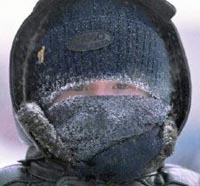Europe

An Interview with Author Alexander Blakely
Siberia Bound
 |
| Cold Facts: Subzero temperatures in Novosibirsk, Siberia, force residents to wrap up warmly. (Photo: AFP) |
For most people, the word "Siberia" conjures up forbidding images of frozen tundra and gulags, dark days and darker nights. For American college graduate Alexander Blakely, Siberia was synonymous with opportunity, risk, and excitement. After graduating from Swathmore College in 1992—just five months after the Soviet Union collapsed—Blakely moved to Novosibirsk, Siberia, armed with a degree in economics and an excess of idealism. “I could imagine nothing more thrilling and meaningful than helping our former enemies rebuild their country on the solid foundation of democracy and market economics,” he writes in his new memoir Siberia Bound: Chasing the American Dream on Russia’s Wild Frontier (Sourcebooks).
But as Blakely is now fond of saying, “Be careful what you wish for.” Though he quickly became a full-fledged entrepreneur with a multimillion-dollar company that shipped “little luxuries” to Siberia (everything from cocoa beans to condoms), Blakely found that the costs of bringing capitalism to Siberia were higher than he’d imagined. In the years following the collapse of communism, materialism and comfort arrived in Siberia, threatening simple pleasures and the leisurely way of life that had existed for centuries. A casualty of the new lifestyle, Blakely’s business partner Sasha gained an empire and lost a family while realizing his entrepreneurial dream.
Siberia Bound is a book about transformation—of a region, a society, and a people. WPR caught up with its author recently to discuss his experience of life on Russia’s wild frontier.
How did you get started as a Siberian entrepreneur?
I met my business partner, Sasha, when I was translating tourist brochures for the company where he was working. The company was expecting a huge crowd of American tourists to come flocking to Siberia, which seemed rather ambitious, and in fact, didn’t happen. I was skeptical and so was Sasha, so we said, let’s come up with a better business plan. We came up with a lot of crazy ideas: We sold paint for dinged-up cars; we sold second-hand clothes by the pound—from Finland, of all places. Old women would come in and weigh the stuff, then go sell it for a pretty significant mark-up on the street. Of all the ideas, the chocolate business, which I was most involved in, was the one that became a multimillion dollar company.
You also got involved in importing latex products later on, didn’t you? Tell me about the condoms and autopsy gloves.
The glove business started much like the cocoa business, that is, almost by accident. The director of what used to be the largest distributor of medical gloves to hospitals in Western Siberia was in a pickle because supply lines from Moscow had dried up. I asked if I could help. She said she needed 1 million gloves for starters. We agreed on a price and I started dialing numbers in search of a million latex gloves. Eventually, I found a glove manufacturer that was already selling products in Eastern Europe, but Siberia wasn’t on their map. So, getting an order for a million gloves from the middle of nowhere was a pleasant surprise for them. They shipped me not only medical gloves, but autopsy gloves (which the Siberians used for picking potatoes) and condoms (which I’m assuming the Siberians used for their intended purposes).
It seems somewhat ironic that you went to Siberia to escape capitalism, yet you wanted to participate in bringing capitalism to Siberia. Were you aware of that irony when you were 22?
Well, yes. I often called myself a druid lumberjack. I loved Siberia for the fact that it was a frontier, and yet I was out there destroying what made it a frontier in the first place. But if you weigh the alternative—I’m able to sleep at night with the fact that there are Marlboro posters up all over Novosibirsk rather than what was there before, empty stores and gulags. I’d rather have imperfect capitalism than the outright oppression of a totalitarian state. It’s the lesser of two evils. My vision of the free market then was a modest one—free-market capitalism didn’t have to happen on the American scale, you could develop a thriving middle class of shopkeepers. But Siberia is a big place, appetites and imaginations are enormous. So the idea of just having a small shop wasn’t good enough for many Siberians. They wanted to take over the entire cocoa industry for central Asia. Every Siberian businessman wanted to be the Bill Gates of Siberia.
You and your partner had grand dreams too, and you achieved a lot—but whereas you came to realize you’d sacrificed too much for your success, Sasha ended up losing his marriage and becoming a harried workaholic. It’s a sad story, yet you’re not saying anything as simplistic as “capitalism corrupts,” are you?
No. I think the moral of the story is, be careful what you wish for. The free market gives you the opportunity to pursue happiness as you choose. Sasha spent so much time on his business that he lost most of his friends and his family. He has since learned from his excesses. He’s said, OK, I need to be a bit more responsible, I have to say no to certain meetings, drink less at work. He’s now the director of a giant refrigeration company, which is quite ironic since he’s in a country which is itself a giant refrigerator! He’s married again, adopted a son, his wife is currently pregnant. He’s spending a lot of time with them, and it’s heartening to see. Others haven’t been so lucky.
Right. It seems that the chaos that resulted from opening the markets was partly due to the Russian mentality: capitalism was being grafted on to a culture where bribery and corruption were the norm. How long do you think it takes to make the transition from a black-market mentality to a free-market one?
I think the transition for a significant percentage of the population happened even before the collapse of the Soviet Union. What used to be the black market became the white market, or open market. But then suddenly, an entire generation that was raised with the idea that capitalism is evil was told, Everything that used to be bad is now good. There’s an Orwellian sense to that. But they understood the irony. It was a cultural hurdle they had to overcome before they became a “civilized” free market. On the other hand, it’s good to take some time and look at ourselves—look at the Enron and WorldCom debacles, it’s the same sins of deception. The people at the top take everything for themselves, lie and cheat and steal. I think the Russians are chuckling a bit to themselves, when they consider that we’ve been telling them for years, you need more transparency. Well, interestingly enough, we have a similar problem here. Capitalism is greed harnessed. But the important thing isn’t the greed; it’s the harness.
How much of what you’re saying here is an indictment of capitalism, and how much of globalization?
Actually, I think overall, globalization has been a positive influence. But it’s what we make of it. If we choose to eat at McDonald’s, we shouldn’t be surprised to see McDonald’s restaurants everywhere. Or you can choose to eat at the local tavern, which probably costs more–ask yourself, is knowing the local tavern owner worth that extra cost? It’s easy to point a finger at some of its evils: people say “globalization” and assume sweatshops. But I think the burden of responsibility is on the consumer. Companies will be as responsible as we ask them to be. McDonald’s has changed how it slaughters cows and how it prepares food, basically because people expressed disgust at what the company was doing. If we want them to be better global citizens, they will be. Unfortunately, people are rather lazy and it’s something of a burden to choose carefully.
Can you recall the moment when you decided that the price you were paying for your success was too high?
Yes: I was in a banya [a Russian sauna], standing sweaty and naked with a bunch of fat industrialists who were talking about how miserable they were and how they needed more shares of this or that. Every business day ended in someone’s office and then moved to one of those old clandestine communist dens of luxury—a club, a restaurant, a bar—where there was lots of drinking and sharing of how terrible life was at home. But rather than addressing their domestic problems head-on, these men preferred to sit and complain. We were spending way too much time with these unpleasant men, especially when you consider that Sasha had a beautiful wife and daughter and I had a beautiful girlfriend, Natasha, at home. It was making us unhappy too—and yet, we were making far more money than 95 percent of the people in Novosibirsk at the time. I realized that being in that hundredth percentile wasn’t going to compensate me for the loss of Natasha, which seemed inevitable because I was never home. It wasn’t hard to connect the dots.
Boris Yeltsin hired some high-profile Western economists to recommend reforms for Russia, but a lot of the policies they recommended were spectacular failures. What went wrong?
Plenty of reputable economists were advising Yeltsin. Quite honestly, I would probably have said the same things they said. My biggest concern was seeing that the communist specter didn’t come back. Everywhere you looked there was the crumbling infrastructure of the communist system. People were starting to get nostalgic for law and order; there was this fear that the masses would give up their freedom for order and security. These economists weren’t trying to build a capitalist system so much as they were trying to bury the communist system. Getting the assets out of the state’s hands was priority number one; getting them into the people’s hands was number two, and, not surprisingly, that step was mismanaged.
How about the way alcoholism pervades all areas of life there, including business? In the book, you write about your American friend Sarah, who held cocktail parties where she’d try to teach Siberians to sip rather than throw drinks down their throats. Is hers a lost cause?
I think Siberians are always going to be a hard-drinking people. It’s not a sipping society. It’s a bipolar nation, a manic-depressive country. If you think about the environment there, you have nine months of cold and dark and three months of sun and fun. It’s not hard to see why they have deeply-ingrained notions of feast and famine. That’s their world. That’s who they are and it’s part of their charm. We medicate for that kind of behavior here. And yet, some of my best and most interesting friends are the most bipolar! It’s unfortunate that it comes at such a cost though. I know several groups now in Siberia that are dealing with the effects of alcoholism—domestic abuse, car accidents, short life spans. That’s important work.
What’s your prognosis for Russia at this point?
I’ve been accused of being a pathological optimist, in that I can see the sunny side of a dumpster, but I do see real signs of hope there. I’m optimistic that in time, the distribution of wealth will even out. In Moscow and Novosibirsk, there are people I know with college degrees who are working as analysts, middle-managers, making a decent wage and having a decent standard of living. They’re no longer living by the old communist adage, “We pretend to work and they pretend to pay us.”
I think there will be a reasonable middle class within 10 years, and that the economy will be in a good state 40 years to the day from August 26, 1991—the day the Soviet Union collapsed. This is playing off the Biblical notion that you have to wander in the desert for 40 years before you get the old ways out of your system.
What kind of scorecard would you give President Putin?
Let me answer that with an anecdote: Did you know that all Russian leaders have followed a pattern up until Putin? From Nicholas II until Yeltsin, they’ve alternated between bald and hairy… that is, until Putin, who, according to the pattern should be bald, because Yeltsin had hair. And I think Putin is bald, but he combs over. In other words, he’s a decent compromise. The hardliners are looking for a man with an iron fist; the liberal democrats are looking for a force of democracy and freedom. And he straddles the two. His version of law and order is definitely democratic. He did his second press conference ever on June 25, and he was asked, which political elite supports him? And he said, the people support me. Whether that’s true or not, the fact that he said it is very encouraging—he didn’t name the army, or the oligarchs.
What would you say now to a 22 year-old graduate who wants to experience a frontier life?
My advice is go, definitely go—in fact, now more than ever, with the current situation, where we’re starting to get this perception that everyone in the world hates America and wants to blow us up. That perception is far more dangerous than the reality, which is that very few people actually hate America. Even so, it’s important for us to have cultural ambassadors who can present a more nuanced version of the U.S. than the latest Hollywood blockbuster does. The chance of someone like Sasha supporting aggression toward the West is nil, because the West is now a person for him: me.
Knowing what you know now, would you go to a country like Siberia again?
In a heartbeat. The best thing I ever did was go to Siberia and establish a company with people whose forebears were my parents’ generation’s enemy. You know, one of the basic tenets of market economics is that any transaction leaves both parties better off, because they’re both going into it by choice, and they’ll only stay for as long as it’s beneficial. I learned a huge amount in Siberia: It was so important for me, in my 20s, to go to a place that pushed me to the limit. Just one qualification: If I go abroad again, I don’t think I’ll be promoting capitalism, because it basically promotes itself. I now realize that what it needs, rather than promotion, is refinement.







